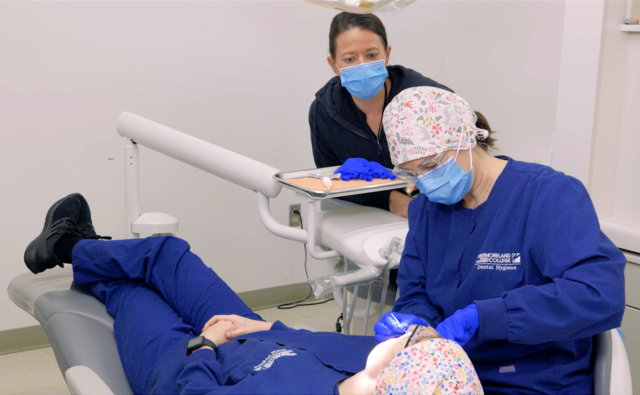Excel in the Growing Field of Dental Hygiene

Ready to enter the dental field as a dental hygienist? Westmoreland offers an associate degree that can prepare you to excel in this growing field. The Dental Hygiene programs is accredited by the Commission on Dental Accreditation of the American Dental Association. The commission is a special accrediting body recognized by the United States Department of Education.
What Will I Learn?
Dental hygienists examine patients for signs of periodontal diseases, administer local anesthesia, clean teeth and provide other preventive services. They also provide patient education to improve and maintain good oral health. The Westmoreland program includes clinical experience in the college campus facility. View Dental Hygiene in the College Catalog.
What Will I Earn?
If you plan to stay in the region, there are many occupations related to this program degree and certificates. In the 10-county region* surrounding Westmoreland County Community College, the earnings for occupations in this field range from $29.36 - $39.65 per hour, with an average hourly wage of $35.42.
It is important to remember that wages vary based on level of education, experience, job location and other factors.
Source: Data provided by Lightcast™ (https://lightcast.io/) 2025.1
* 10-county region includes Allegheny, Armstrong, Beaver, Butler, Fayette, Greene, Indiana, Lawrence, Washington and Westmoreland.
Career Opportunities
While most dental professionals practice in private dental offices, others provide services in dental specialty practices, hospital and industrial clinics, correctional institutions, government health agencies, insurance companies and military services. With additional education, dental professionals also work in school systems, dental and dental hygiene education programs, dental sales and research.
Basic Application Process - Health Professions
- Complete and submit an Application for Admission to
the college - Receive a College Login: 24-48 business hours after applying, you will receive a college login.
- Log into Westmoreland: Use your login to access "MyWestmoreland" from the top of any page on the college website.
- Complete the Health Professionals Program Application: Within MyWestmoreland, go to Student Resources and Popular Links to find the Health Professions Application. Two applications are required: Westmoreland application and Health Professions Application.
- Download the Dental Hygiene Application Checklist for details on additional requirements.
- Pay for, complete, and submit the National League of Nursing Preadmission Exam (NEX) to Westmoreland County Community College. The exam assesses your ability to meet the demands of the Dental Hygiene Program and assesses your skills in math, English, reading, language, and science. You will be evaluated based on the highest of up to two exam attempts submitted to the college per year. More information about the Entrance Exam can be found here.
- Submit official transcript from all secondary schools attended, graduate equivalency degree (GED) programs and any other formal educational program beyond high school.
- Application Deadline: January 12 prior to fall start
- Acceptance Notification: Mid-March
Accreditation
As part of the program accreditation process, please find the Third Party Comment Form for Accreditation.
Frequently Asked Questions
Once accepted into Westmoreland’s Dental Hygiene Program, students can complete the program in five semesters, which is two academic years.
No, once accepted to the Dental Hygiene Program, students must complete the program in the recommended sequence.
A student must have all pre-admission courses (algebra, biology and chemistry) and any required developmental courses. This must be completed by the application deadline date of January 12th, in order to be eligible for the NLN Pre-Entrance Exam.
The three required program prerequisite courses must be completed by the program start date. A student's acceptance will be provisional based upon successful completion of the course.
All courses must be completed with at least a “C” grade and the GPA must be 2.5 or above.
Dental hygiene classes are scheduled on Monday through Friday between the hours of 8 a.m. and 5 p.m. Clinical courses are scheduled to include two evenings of clinic each semester.
The evening clinic sessions in the fall and spring semesters are scheduled from 5 p.m. until 8:30 p.m. The evening clinic sessions in the summer semester are scheduled from 4 p.m. until 8:10 p.m.
Individual class schedules will vary from semester to semester.
Yes, students are responsible to secure the types and classifications of patients that they need to meet the clinic requirements for progression in the dental hygiene program.
The dental hygiene clinic does have a pool of public patients that are distributed on a rotating basis to students in the program.
Due to intense curricular demands, students are advised NOT to work while enrolled in the dental hygiene program. However, if the student has enough support at home, some students have been successful at working 10 – 20 hours per week while enrolled in the dental hygiene program.
Work schedules must be flexible to accommodate the changing demands of the program from semester to semester.
Students that must work more than 20 hours per week have not been successful at completing the dental hygiene program.